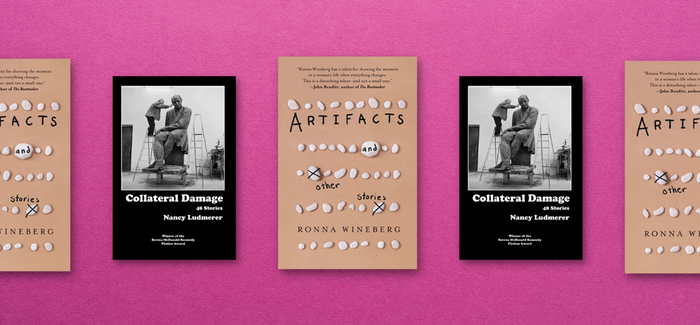Books
Short Stories for Jewish Women in the Throes of Love
The short story has a long history in literature as well as biblical and talmudic tradition. Indeed, Alice Munro, the only writer to win a Nobel Prize for short stories, once noted that “wherever women get together, I think there’s an urge to tell stories.” She also said a short story should be as “durable and freestanding” as a house.
In two new story collections, writers Ronna Wineberg and Nancy Ludmerer have accomplished that feat while carrying on the tradition, both Jewish and secular, of women telling stories.
Artifacts and Other Stories
By Ronna Wineberg (Serving House Books)
In Artifacts and Other Stories, Wineberg, author of two previous collections and the novel On Bittersweet Place, gives us 14 stories about women, mostly Jewish New Yorkers, whose lives are sometimes dictated by Jewish values, though not often by observance. These are women in the middle years of their lives, some still married and others recently divorced, all asking what love is and what the future holds.
In “Hurricane,” the most Jewish of the tales, Alice has an affair with Todd, whom she met in synagogue. On Saturdays, after services and “when both their spouses are otherwise occupied because neither has a spiritual life,” Alice and Todd make love at a hotel.
“It is an odd ritual, Alice knows, after worshipping and imploring God for blessings, to then break a commandment,” writes Wineberg. Like many of the collection’s female characters, Alice thinks she loves her husband but isn’t sure they still are—or ever were—compatible.
Wineberg is a master of metaphor. In “Framing the Picture,” Ginny considers leaving her scientist husband, Lew, wishing people were as transparent as the zebra fish he studies. “Why weren’t our hearts, needs, and desires transparent, too?” she thinks.
In “Dislocation,” Laurel wonders whether the appearance of a second bed in her bedroom, to accommodate the bad back of her husband, Mark, represents the dissolution of their marriage.
The title story features recently divorced Nina visiting her online date’s apartment to view his spectacular collection of international artwork and sculpture. Afterward, she ponders the significance of the old photos and children’s art cluttering her own lonely apartment. As in most of these stories, Wineberg’s main character wonders “what she is doing here. Here, meaning not just his bed and his apartment, but here, in her life.”
These stories do not end with closure, but with the women soldiering on, living their lives and searching for that ephemeral thing called love.
Collateral Damage: 48 Stories
By Nancy Ludmerer (Snake Nation Press)
Collateral Damage: 48 Stories is Ludmerer’s debut book and a winner of Snake Nation Press’s Serena McDonald Kennedy Award for Fiction. These stories are brilliant bits of flash fiction. Many fit on just one page yet capture entire worlds. The title story contains only nine lines, told from the point of view of a fly. “With humans,” the fly observes, “every day is bloodshed.” The “bloodshed” in this story, as in many in the book, is a metaphor for marriage.
Although there is much more variety in this collection than in Wineberg’s, many of the characters are likewise New York Jewish women in the throes of love, marriage and divorce. In “Spirit of the Staircase,” Emily leaves her fiancé at home in New York for a business trip to Paris, where she reconnects with Robert, who once broke her heart. They don’t sleep together, “but still Emily felt guilty.” Even after Robert hurts her once again, her parting words are, “If I’m ever back in Paris, I’ll let you know.”
In the one-paragraph “Bar Mitzvah,” Dinah, “the wicked stepmother,” saves her stepson Benjy from choking at his own bar mitzvah buffet. Afterward, Benjy’s mother, the narrator of the story, says to herself “…thank you God while this woman who had wrecked our lives ten years earlier hugged my son, and I knew then, on his Bar Mitzvah day, that for everything there is a purpose under heaven.”
“Dream Job,” Ludmerer’s longest piece at nine pages, is a tragic New York story. Alice, a temp agency employee, placed a young woman, Liana Broder, in a financial-sector job on September 10, 2001. Fifteen years later, Liana still haunts her dreams.
The short story writer’s consummate skill is to capture an entire novel’s plot in a few pages, or even a few paragraphs. Veteran Ronna Wineberg and newcomer Nancy Ludmerer both display that skill in abundance.
Elizabeth Edelglass is a fiction writer, poet and book reviewer living in Connecticut.













 Facebook
Facebook Instagram
Instagram Twitter
Twitter
Leave a Reply